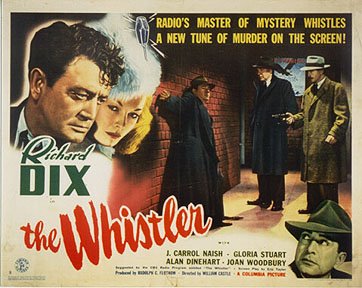
This is a very busy week for me, deadline-wise, so I've perused my files for bits of previously unpublished writing to keep this blog going while I am otherwise disposed. Here's a fragment from a project that didn't get much further than this, though I like what I did here. Maybe I'll go back to it someday and finish what I started.
As I have said many times before, Columbia owns a vaultload of terrific crime B-movie series -- not just The Whistler, but also The Crime Doctor, Boston Blackie, and The Lone Wolf -- and it would be wonderful to have them in box sets on DVD. Several of the Whistler and Crime Doctor pictures were directed by none other than William Castle, and they occasionally point to ideas he expanded upon in his later, better-known films. -- TL
______________
THE WHISTLER (1944), MARK OF THE WHISTLER (1944), POWER OF THE WHISTLER (1945), VOICE OF THE WHISTLER (1945), MYSTERIOUS INTRUDER (1946), THE SECRET OF THE WHISTLER (1946), THE THIRTEENTH HOUR (1947), THE RETURN OF THE WHISTLER (1948)
Unlike Columbia's other crime series of the 1930s and '40s, the Whistler series is not constructed around a recurring role. Like the Columbia Broadcasting Services radio program which inspired it, the Whistler films are an anthology series, unified by the constant but otherwise hazy presence of The Whistler. Voiced by the otherwise unseen Otto Forrest, The Whistler is a slouch-hatted, trench-coated silhouette of a man who whistles a hauntingly discordant, halting tune as he strolls by night; because he walks the streets after dark, he "knows things" about the people who have"stepped into the shadows of life."
In all but the last of the eight Whistler films, these tragic protagonists are portrayed by the same actor: Richard Dix. Like most of the other Columbia crime series stars, Dix was a former matinee idol of the silent and early talking screen. He was in his 50s, but as with the dialogue in Warner Baxter's "Crime Doctor" films, the young actresses appearing opposite him often refer to him as handsome and quite a catch. A beefy, cordial actor who sometimes slurred and clipped his lines, Dix could turn on the ice as well as the charm, but was not an actor of particularly broad range. Nevertheless, the Whistler series turned him into one.
Alone of all the Columbia crime series, the Whistler films offered their continuous lead perpetual opportunities to extend his playbook. In seven short pictures, Dix portrays a melancholic, a quirky gumshoe, a workaholic executive, an amnesiac who gradually awakens to his identity as a murderer, as well as men in love, sociopaths, bad luck charlies, and normal honest guys driven into desperate corners by circumstance who must bend the law... usually past its breaking point. In each of Dix's performances, one tonality is ever-present: a furtiveness which recalls the later performances of David Janssen in TV's THE FUGITIVE (1963-66). Beset by a series of strokes, Dix retired from films in 1947 and died of a heart attack in 1949 at the age of 56. A solid attempt to perpetuate the series, 1948's THE RETURN OF THE WHISTLER, failed to be carried commercially by top-lined actor Michael Duane.
For all their edgy, paranoid atmosphere, the Whistler films nevertheless portray a shadowy world in which it is comparatively safe for people, like The Whistler, to walk by night. In THE POWER OF THE WHISTLER, our heroine (Janis Carter) approaches a perfect stranger, for whom she has read a baleful fortune in a deck of playing cards, and not only pursues his acquaintence to warn him, but when he shows signs of dizziness, she steps with him into the backseat of a stranger's parked car until he feels better! And when the car's owner (I. Stanford Jolley) happens along, he not only shows no sense of outrage at their presumptuous trespass on his property, but offers to drive the two strangers wherever they might need to go! Likewise, in THE VOICE OF THE WHISTLER, a former UK lightweight boxing champion (Rhys Williams) gladly retires his cab stand in order to follow a wealthy chance acquaintence and his new bride to a solitary lighthouse, to work as their general dogsbody.
All in all, the Whistler universe is an unusually healthy, trusting and upbeat world... but, as is common in the writings of series contributor Cornell Woolrich and in the annals of film noir in general, it is a world governed by ironic fate. Things go wrong, bad pennies keep turning up, the best laid plans turn out to be rotten eggs. And nowhere in the Columbia crime series are these principles more directly and piercingly felt than in the Whistler films, because the misfortune always befalls Dix, whomever he might be portraying. The Lone Wolf, Boston Blackie and The Crime Doctor get into their share of hot water, but it's always circumstantial; in the Whistler films, the hot water is always existential.
For more hard data and beautiful graphics pertaining to this series, check out this well-stocked Whistler website.